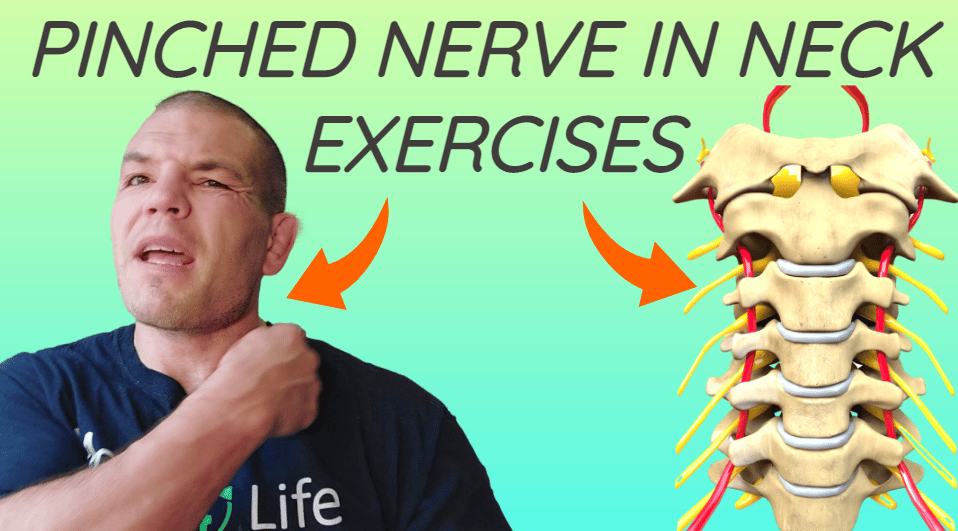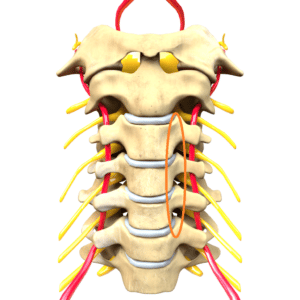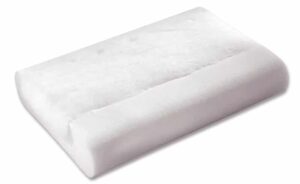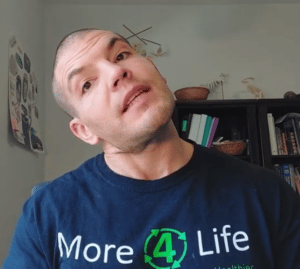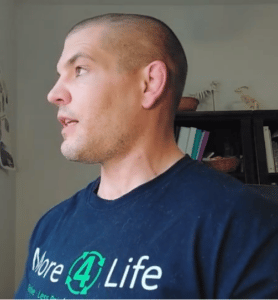Have A Pinched Nerve In Your Neck? These Exercises Can Help.
Watch the video to find out how to tell if your neck pain is really coming from a pinched nerve. Plus, learn the best pinched nerve in neck exercises...
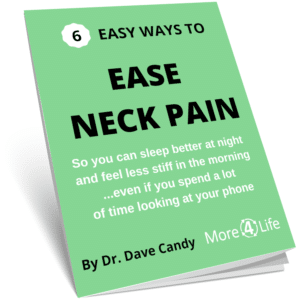
Wake Up With A Pinched Nerve In Your Neck?
Have you ever woken up with a stiff neck seemingly for no reason?
When people wake up with a sharp, stabbing pain in their neck, they often think that they have a pinched nerve.
And sometimes they do.
But not all sharp, stabbing pain in the neck comes from a pinched nerve.
How To Tell If You Have A Pinched Nerve In Your Neck
A true pinched nerve in the neck causes radiating pain, numbness, or tingling in to the shoulder, arm, or hand. You may also notice weakness in your arm or hand.
If you DON'T have any of these symptoms, then it's likely that you DON'T have pinched nerve.
You may still have a sharp stabbing pain in your neck and difficulty turning it. However, if you just have localized neck pain, it's probably not a pinched nerve.
However, it's still painful, and I'll bet you'd like to get rid of your neck pain regardless of the cause.
Things People Often Describe As Pinched Nerves
Some common symptoms that people refer to as a pinched nerve in their neck include:
- Waking up with a stiff neck and getting a sharp, stabbing pain that's local to their neck.
- Having radiating symptoms in their arm or hand from a pinched nerve.
- A "stinger" or other traction injury to nerves that also causes radiating symptoms into the arm or hand.
The first case is usually a muscle and joint problem and not a true pinched nerve. The second case is a true pinched nerve, and the third case is more of a "pulled" nerve - with a very different treatment approach than a pinched nerve.
I'll describe each of these cases below as well as the best exercises for each.
It's Not Really A Pinched Nerve, But It Still Hurts
The most common problem I hear people refer to as "a pinched nerve in my neck" is when they wake up and their neck is stiff and they have a sharp pain when trying to move it.
Most of the time this problem isn't caused by a true pinched nerve, especially if the pain is localized to your neck and doesn't radiate down your arm.
However, it still hurts, and it's quite literally a pain in the neck when you can't turn your head to check your mirrors when driving in the car.
Neck Pain From Joint Dysfunctions
The joints in your neck can get stiff or in some cases "locked" if you sleep with your head too far twisted or to far leaned to the side. This can happen from:
- sleeping on your stomach
- falling asleep on the couch with your head poorly supported, or
- using a pillow that is too high or too low
The facet joints (on the back of your neck) are one cause of this problem. They are shown in the neck x-ray shown above.
If part of the joint capsule gets pinched inside the joint, it can cause sharp pain when turning your head side to side.
Additionally, your neck has another special set of joints called uncovertebral joints that form lips along the side of the neck.
The uncovertebral joints can cause a limitation in tipping your ear to your shoulder. One of the most common causes of this type of joint dysfunction is sleeping with a pillow that is too low. Doing so allows your head to tip too far to the side.
Pillow For Pinched Nerve In The Neck
If you sleep on your side, make sure to use a pillow that supports your neck in midline. Doing so will ensure that your neck doesn't tip too far to the side.
Here is the pillow that we recommend to many of the patients in our office
The Pillo-Pedic Pillow has a 4-in-1 design offers different levels of height and firmness for all body types to support your neck in a midline position and allow you to sleep comfortably.
Exercises For Neck Pain From Joint Dysfunction
An uncovertebral joint dysfunction keep you from tipping your head toward the side of the involved joint.
Therefore, the best exercise for this type of neck pain is tipping your head AWAY from the sore side.
If you have pain tipping your head to the left, stretch by tipping your head to the right. This will stretch the joints and muscles on the left side of your neck.
What Does A Pinched Nerve In Neck Feel Like?
Symptoms of a pinched nerve in your neck may or may not include neck pain. A true pinched nerve in your neck will cause pain, numbness, tingling, and/or weakness in your shoulder, arm, or hand.
You may also have neck pain, but the arm symptoms are what distinguishes a pinched nerve from just a joint dysfunction.
Most of the time pinched nerves in the neck come on gradually over time such as from degenerative disc disease.
You may only notice slight symptoms at first, but the longer the nerve stays pinched, the more severe the tingling becomes. You may even start to notice weakness in your had or start dropping things as symptoms get more severe.
The sooner you get treatment for a pinched nerve in your neck the better result you'll likely have. If you'd like to meet with one of our specialists to find out how we can help you, just tap the button below to request a Free Neck Pain Consultation.
Pinched Nerve In Neck Exercises
Exercises for a pinched nerve in your neck should focus on opening the spaces where the nerves come out of you spine.
If the neve is being pinched on one side of the neck, you want to tip your head to the opposite side.
If you have a pinched nerve on the left side of your neck, tip your head to the right to decompress the nerve.
Additionally, bringing your chin down toward your chest also opens the spaces where the nerves come out of your spine.
Keeping you chin tucked down as shown above allows you to keep your neck in a good position throughout the day.
Additionally, doing exercises with your chin down can help.
Read These Posts For Other Pinched Nerve In Neck Exercises
Is Traction Good For A Pinched Nerve In Your Neck?
Traction can be helpful for a pinched nerve in your neck. If you have degenerative disc disease or have otherwise lost space between your vertebrae, traction helps decompress the joints and nerves in your neck.
The relief is only temporary because once you stand back up, gravity starts pushing down on your head and neck and compressing the nerves again.
However, using an over-the-door neck traction unit at home is an inexpensive way to take the pressure off of pinched nerves in your neck and give you some relief.
Again, it's not a long-term fix, but because you own you can use it as often as you need it.
Pulled or Overstretched Nerve In Neck
This is basically the opposite of a pinched nerve in your neck. Instead of being compressed, the nerve root and brachial plexus are overstreched.
This can happen acutely from an injury like a "stinger" in football or a car accident.
It can also happen over time if you have one shoulder that is lower than the other. This often happens on the dominant side because people tend to use their dominant arm more. Therefore, there's more downward pull on that shoulder over time.
If you have this type of a problem, stretching the nerve isn't a good idea.
Instead, doing exercises that involve lifting your shoulders and raising your arms overhead are a better choice.
Additionally it's important to make sure to get good arm support during the day so that the weight of your shoulders and arms aren't pulling down on your neck all day.
Need Help For A Pinched Nerve In Your Neck?
Request an appointment with one of our specialists to find out how we can help.

